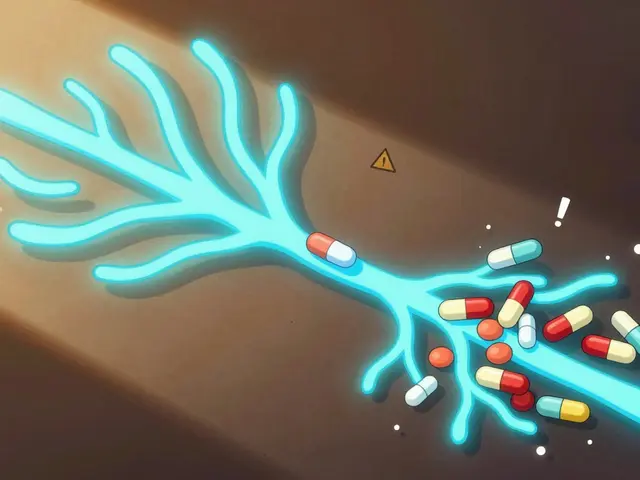Dopamine Norepinephrine Reuptake Inhibitors (NDRIs): What They Do and Who They Help
Want better energy, focus, or relief from depression without the sexual side effects many people hate? Dopamine norepinephrine reuptake inhibitors (NDRIs) are a class of medicines that can help with that. They boost two brain chemicals — dopamine and norepinephrine — which affects mood, drive, and attention.
How NDRIs work
NDRIs block the transporters that pull dopamine and norepinephrine back into nerve cells. The result: more of those chemicals stay active in the brain for longer. That can lift mood, sharpen focus, and increase motivation. Bupropion (Wellbutrin) is the most common NDRI used for depression and smoking cessation. Drugs like methylphenidate and some stimulants also increase dopamine and norepinephrine, but they work a bit differently and are usually used for ADHD.
Because they act on dopamine, NDRIs often cause fewer sexual side effects than many SSRIs. They can also help if you feel tired, slow, or unmotivated — symptoms that some antidepressants don’t address well.
What to watch for
Side effects are usually direct and dose-related. Expect things like trouble sleeping, dry mouth, jitteriness, increased heart rate, or mild anxiety. Bupropion carries a small but real seizure risk, especially at higher doses or if you have a history of seizures or an eating disorder. NDRIs can raise blood pressure, so doctors check vitals before and during treatment.
Don’t mix NDRIs with MAO inhibitors. Also be careful with other stimulants, medicines that lower your seizure threshold, or heavy alcohol use. If you’re pregnant, breastfeeding, or have heart disease, bring this up before starting an NDRI.
How do you know if an NDRI might suit you? People who haven’t responded to an SSRI, who struggle with sexual side effects, or who need help quitting smoking are common candidates. ADHD patients may benefit from stimulant options that affect dopamine and norepinephrine, but those are managed differently and often by a specialist.
Practical tips: start low and go slow, take doses in the morning to avoid insomnia, and tell your provider about any seizure history or eating disorders. If palpitations, chest pain, sudden mood swings, or new suicidal thoughts appear, contact your clinician right away.
Looking at alternatives? SNRIs, SSRIs, or non-drug therapies (therapy, exercise, sleep changes) might be better depending on your symptoms. Bring a clear list of symptoms and past meds to your appointment — that helps your prescriber choose the right option faster.
Want help preparing for a talk with your doctor? Note when your symptoms are worst, any side effects you’ve had before, and your goals (better sleep, more energy, quit smoking, etc.). A focused conversation makes picking the right treatment much easier.

Dopamine-Norepinephrine Reuptake Inhibitors: How Wellbutrin and Its Alternatives Work
Curious about how medications like Wellbutrin fight depression? This deep dive explains dopamine-norepinephrine reuptake inhibitors (DNRIs), covering how they work, why Wellbutrin stands out, and what you should know about related drugs. If you’re exploring depression treatments or are puzzled by your own prescription, this readable guide untangles the science behind DNRIs with concrete examples and practical advice. Whether you’re thinking about starting medication or just after the neuroscience, get the real scoop here. Plus, find out when an alternative for Wellbutrin might make sense.
read more
